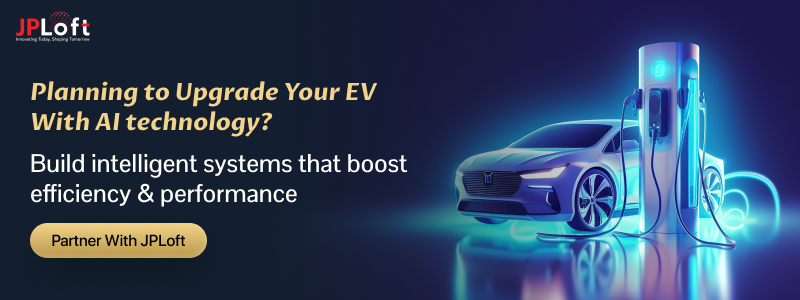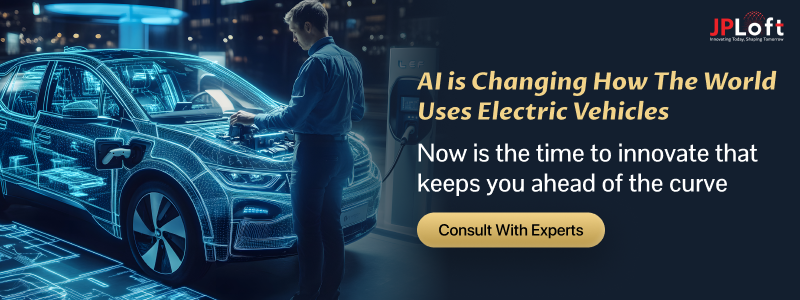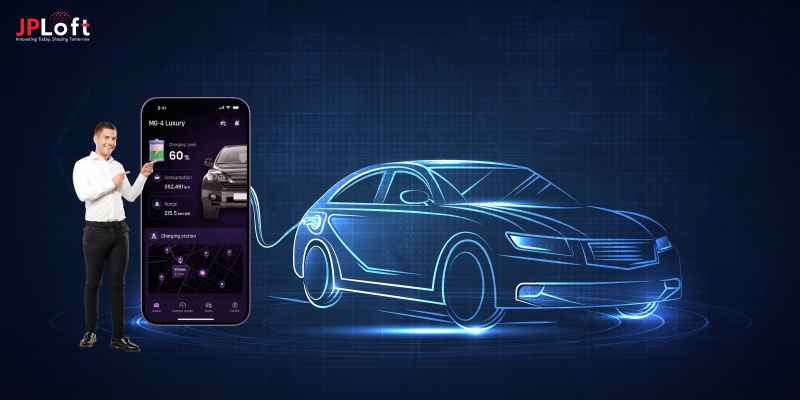Key Takeaways:
AI is transforming electric vehicles by improving efficiency, safety, and the user experience through automation, data-driven insights, and smarter software systems.
Global EV sales are expected to exceed 20 million units by 2025, creating strong demand for AI-powered EV software and apps.
The key benefits of AI are optimized energy use, battery life, and charging efficiency while reducing maintenance costs and enhancing driving comfort.
AI plays a key role in every stage of the EV lifecycle, from smart design and manufacturing to intelligent driving and maintenance.
Key AI use cases include route planning, charging optimization, predictive maintenance, and autonomous driving for both users and fleet operators.
Successful AI integration starts with clear goals, quality data, proper training, and real-world testing before deployment.
The cost to implement AI systems can range from $20,000 to $250,000 or more, depending on complexity, features, and hardware requirements.
The challenges in AI implementation include high costs, data security, and hardware limitations.
AI will drive the future of electric mobility with self-learning systems, vehicle-to-grid connectivity, and advanced personalization.
Artificial Intelligence (AI) and Electric Vehicles (EVs) are both parts of the modern economy that were once envisioned to be the future.
The electric vehicles are making commuting comfortable while controlling carbon emissions, and AI is improving users’ convenience by offering unique features. Hence, the next approach is to blend these modern technologies to deliver a comprehensive user experience.
AI in EV Software is transforming the space by enhancing safety, efficiency, and user experience. Such is being done through the application of innovative applications like predictive maintenance, energy optimization, and autonomous driving.
The AI investment in the automotive segment is projected to cross USD 14.92 billion by 2030. Such an investment will span across operations and development aspects. Hence, such reflects the future potential and transformation that AI is expected to bring in the EV space.
In this blog, we will discuss how Artificial Intelligence in Electric Vehicles is not just an industry trend but will transform the way people use EVs and the experience it offers.
Market Overview of Electric Vehicles
AI technology is changing electric vehicles and how the EV segment works, and such a change can be justified through relevant industry statistics.
-
The global sales of electric cars, including both BEVs and PHEVs, will cross 20 million units by the end of 2025. Such sales figures will result in EVs accounting for more than 25% of all new cars being sold in 2025.
-
Globally, there are more than 1.3 million public charging points, and with the rise in the number of EVs sold, the number of these chargers is also increasing. Also, with such growth, the demand for AI in electric vehicle charging software is increasing.
-
As per reports, more than 70% of EV users prefer or adopt the EV apps due to the advanced features offered, including in-app payments for public charging, charge scheduling, and more.
-
The EV manufacturers, including Tesla, Mercedes, and BMW, are also launching their EV apps to offer a better experience to users. But their apps are mainly focused on the products offered by the brand.
Hence, there exists a significant opportunity to offer a blended experience to the users through AI integration in electric vehicles.
Benefits of AI in EV
The electric vehicles (EVs) and charging systems are significantly influenced by the AI advancements and integrations. It helps improve performance, reduce costs, and make driving safer and easier.
Here are some key benefits of using Artificial Intelligence in EV software.
1. Better Energy Use and Longer Battery Life
AI innovation in electric vehicles will help better energy use and longer battery life. AI can better track your battery performance, charging history, and other relevant inputs.
Based on this, the app can provide better insights regarding when to charge, how much to charge, as well as other inputs regarding how to improve your EV’s battery life.
2. Smart Charging and Power Management
The integration of AI makes EV charging smarter by predicting when and where people will need to charge. An EV station management app helps manage how much power is used at each station, so the grid doesn’t get overloaded.
For charging station owners and fleet operators, this means lower energy costs and fewer power issues.
3. Predictive Maintenance
Further, it can be identified that Artificial intelligence for EVs can help spot problems with car batteries or the charging system before they become too costly to eliminate. By constantly checking data from the battery, motor, and other parts, it can tell when something might fail.
This helps reduce breakdowns and repair costs. For fleet owners, predictive maintenance means more uptime and fewer delays. For drivers, it means a safer and more reliable ride.
4. Personalized Experience
Along with all, AI in electric cars can offer personalized experiences to the users. It learns the driver’s habits and suggests the best routes, charging stations, and times to charge.
It can also recommend energy-saving tips or find nearby charging points when the battery is low. Some EVs even use AI assistants that talk to drivers and help manage settings. This makes driving feel easier and more connected.
5. Lower Costs and Greener Operations
AI into electric vehicles can also help cut costs in many ways. It saves energy, reduces maintenance expenses, and improves how vehicles and chargers work together.
It also supports eco-friendly goals by using clean power more effectively and reducing waste. For both users and businesses, AI makes EV ownership more affordable and sustainable.
6. Faster Innovation and Smarter Systems
The trend shift toads AI electric technology is not just for users’ convenience, but for the operators it helps improve EV software quickly. It studies data from thousands of users and learns how to make the system better over time.
This allows EV apps and vehicles to stay updated and smarter without constant manual upgrades.
Role of AI in the Electric Vehicle Industry
The benefits of Artificial Intelligence in EVs reflect why the tech is being supported, and also why, as an entrepreneur, you should invest your time in “How to make AI software for electric vehicles?”.
But along with these benefits, it is important to understand the role of AI and how AI is taking the lead in transforming Electric Vehicles. From the industry perspective, it can be identified that AI is playing a significant role in transforming every aspect of the sector.
The key roles of AI in the EV industry at diverse levels can be identified as:
A] Smarter Vehicle Design and Manufacturing
The role of AI in the EV industry starts by helping automakers design and produce EVs more accurately.
The implementation of AI can help study data from sensors, performance tests, and past models to predict how parts will behave under different conditions.
Such data allows engineers to design AI-based electric vehicles that perform better and are technically advanced.
Also, in manufacturing plants, AI-powered systems track quality, reduce errors, and automate complex tasks. As a result, production becomes faster, safer, and more cost-efficient.
B] Better Battery Management and Efficiency
For EV users, AI technology applies to electric vehicles and ensures better battery management and efficiency. AI helps manage batteries more effectively by studying data like temperature, charge cycles, and driving habits.
It uses this information to balance power usage, prevent overheating, and extend battery life. With AI-based battery management systems, EVs can perform consistently in all weather conditions and charge more efficiently, resulting in better performance.
C] Smart Charging Infrastructure
The technology upgrades, including artificial intelligence, are transforming electric vehicles' charging infrastructure and making them smarter and more reliable for both users and operators. It effortlessly predicts when and where charging demand will increase and helps distribute power evenly across the grid.
For drivers, AI-powered electric vehicle apps show the nearest available stations and recommend the best time to charge based on cost and power availability. For grid operators, it ensures stations run efficiently while reducing energy waste.
D] Safer and Smarter Driving
AI-Powered EV systems play a significant role in autonomous and driver-assist systems. It processes real-time data from sensors, cameras, and radar to detect objects, understand surroundings, and make safe driving decisions.
Even in non-autonomous cars, AI supports smart features like lane assist, adaptive cruise control, and collision alerts. These systems improve road safety and make driving more comfortable and stress-free.
E] Fleet and Energy Management
Operating electric fleets and managing vehicles more effectively is another AI EV use case that businesses need to focus on. It tracks performance, plans efficient routes, and schedules charging times to reduce downtime.
AI studies factors like traffic, terrain, and weather to find the best routes, saving both time and energy. For large operators, it also connects with smart grids to manage electricity use more efficiently, cutting both costs and emissions.
F] Predictive Insights and Maintenance Support
AI-powered Electric Vehicles also provide automakers and service providers with continuous insights about vehicle health and performance. It predicts maintenance needs and alerts users before an issue becomes serious.
This reduces repair costs and helps prevent unexpected breakdowns. It also allows companies to offer personalized customer support, such as reminders for servicing or charging recommendations based on driving habits.
Use Cases of AI in EV
If you are looking for information regarding “How to build AI-powered EV software?”, then you should start by knowing the potential use cases of AI in EVs.
AI Technology in Electric Vehicles is making electric vehicles (EVs) smarter, safer, and easier to use.
It assists with everything from saving battery power to planning routes and keeping the car in good shape. Here are some key AI EV use cases in the current industry.
1] Smarter Battery Care
Rather than investing in building an EV App with basic features, invest in AI that can help take care of the battery, which is the most important part of an EV. It studies how the battery is charged and used every day.
Based on this data, it makes small changes to manage the battery temperature, prevent damage, and make it last longer. It can even tell the driver when the battery needs attention, helping avoid surprise failures.
2] Smart and Fast Charging
Artificial Intelligence in electric vehicles not only helps maintain battery health but also makes charging simpler and more efficient. It checks which charging stations are busy and guides drivers to those with open spots.
It can also plan the best time to charge based on power prices as well as your schedule, helping users save time and money.
For charging companies, implementing AI solutions can balance how much energy each station uses, preventing overload and power waste.
3] Better Route Planning
Another use case of AI integration in electric vehicles is route planning. It helps drivers find the best route for their trip by analyzing the real-time traffic, weather, and battery levels.
Also, if the car is running low on power, the EV charging station finder app development powered by AI can quickly find and suggest nearby charging stations and tell how long the charge will take. This helps drivers travel with confidence and worry less about running out of power.
4] Safer Driving and Self-Driving Features
AI in Electric Vehicles is the technology behind self-driving and driver-assist features. It reads data from cameras and sensors to spot cars, people, and road signs.
It helps the car stay in the right lane, slow down when needed, and avoid collisions. These features make driving safer and more relaxing for everyone on the road.
5] Early Problem Detection
The AI EV use case also involves problem detection and ensuring better maintenance. It studies how parts like motors, brakes, and cooling systems work.
When something doesn’t look right, it warns the driver before it turns into a big issue. Such an approach means fewer breakdowns, lower repair costs, and a smooth riding experience.
6] Easier Fleet Management
Companies that run several EVs, like delivery or taxi services, use AI to manage them better. It tracks each vehicle’s location, battery level, and condition.
Hence, the fleet owners can build a fleet management app powered by AI that helps plan routes, set charging times, and predict their maintenance schedules. This helps businesses save time, reduce fuel costs, and operate more smoothly.
7] Personalized Driving Experience
AI technology is transforming electric vehicles and making every ride more comfortable and personal. It remembers driver preferences like seat position, temperature, and favorite routes.
It can even recommend where to stop for food or charging on long trips. Many EVs now have AI voice assistants that assist drivers when driving. Such assistance is provided in the form of temperature control, music control, and other mechanical adjustments if required.
8] Smart Energy Sharing
The software powered by AI in Electric Vehicles connects EVs to the power grid in a smart way. It helps balance energy use during busy hours and allows cars to share extra power with the grid when needed.
This feature, called vehicle-to-grid or V2G, helps reduce energy waste and supports cleaner energy use.
How to Implement AI in EV?
AI integration in electric vehicles is a step-by-step process that requires the right planning, data management, testing, and partnering with the right experts.
When done properly, it helps define the time required to develop an EV app, ensures better performance of EVs, better energy management, and offers a smoother experience for drivers.
Here’s a step-by-step process on “How to make AI software for electric vehicles?”
Step 1: Set Clear Goals
The initial step is to decide what you want the AI system to do. Hence, it is important to set clear goals regarding your AI EV use cases; it could be improving battery life, predicting maintenance needs, or managing charging stations.
Having a clear goal and an electric vehicle app idea helps guide the entire development process and ensures the system delivers useful results.
Step 2: Collect and Prepare Data
Once you have decided on your goals and direction regarding AI in EV apps, the next step is to procure and prepare data sets that can help make smart decisions. This data can be secured from sensors, GPS, and vehicle systems.
But along with collecting data, it is important to clean and organize the data before putting it to use. Quality data helps AI models learn patterns and make accurate predictions during real driving and charging situations.
Step 3: Choose the Right AI Tools
Different AI features use different technologies. Hence, based on your goals and app vision, it is important to choose relevant or right tools.
-
ML integration with the help of a machine learning development company helps with predictions like battery health and energy consumption.
-
Computer vision development services can help power driver-assistance and self-driving systems by analyzing visual input from cameras.
-
Natural Language Processing development services are used to build in-car voice assistants that help drivers interact with the system.
Choosing the right AI tools and frameworks ensures the software runs smoothly and delivers reliable output.
Step 4: Train and Test the Models
Once the data is ready, the next step is to train AI models to identify patterns and make predictions.
These trained models can further be tested using real and simulated data or scenarios, and define how well they perform. Mobile app testing helps improve the accuracy and speed of decision-making.
Step 5: Integrate AI into the EV System
After testing the EV AI technology, it ensures the AI system is connected to the main EV software. This allows it to interact with sensors, onboard computers, and apps in real time.
A well-integrated AI setup makes it easier for the vehicle to analyze data and respond quickly to changing conditions.
Step 6: Test in Real Conditions
After integrating the AI in EV software, these systems must be tested in real environments like roads, charging stations, and different weather conditions.
Such testing can help identify weaker points and improve performance before large-scale implementation. Also, it helps ensure that the AI works consistently across different vehicles and situations.
Step 7: Ensure Data Safety and Compliance
AI handles large amounts of user and vehicle data. To keep it secure, developers use strong encryption and follow safety standards like ISO 26262.
Data protection builds user trust and keeps the system reliable. If you have partnered with an experienced AI development company, then they take care of every data safety and compliance.
Step 8: Post-Launch Updates
The EV systems built on AI learn and improve with time through the data fed into the system and the new data it records from regular car usage. With continuous learning and updates, they can adapt to new driving patterns, road conditions, and user habits.
Over-the-air updates allow quick improvements without requiring manual upgrades or extra hardware.
Step 9: Monitor and Maintain the System
Once deployed, the AI-powered EV systems should be monitored regularly. Tracking its performance helps identify issues early and keeps it efficient.
Ongoing app maintenance services also ensure the system stays compatible with new EV technologies and standards.
How Much Does it Cost to Implement Artificial Intelligence in EVs?
AI is taking the lead in transforming Electric Vehicles, but as an entrepreneur, investing in electric vehicles and AI, you should be aware of the associated costs.
The cost of implementing AI in EV Software can range anywhere from $25,000 to $120,000 or even more.
Such a mobile app development cost depends on several factors, ranging from the type of platform you are aiming to build, the complexity, and how deeply AI is built into the system.
|
Category |
What It Covers |
Estimated Cost Range (USD) |
|
AI Feature Development |
Building core AI functions like route planning, smart charging, or battery analytics |
$25,000 – $35,000 |
|
Advanced AI Systems |
Self-driving support, deep learning models, and real-time decision systems |
$40,000 – $120,000 |
|
Data Collection & Training |
Gathering, cleaning, and training AI on driving and charging data |
$5,000 – $25,000 |
|
Hardware & Integration |
Sensors, processors, IoT integration, and backend setup |
$10,000 – $40,000 |
|
Software Development & Testing |
Coding, testing, debugging, and model fine-tuning |
$15,000 – $60,000 |
|
Customization & System Integration |
Connecting AI modules with existing EV platforms or apps |
$5,000 – $25,000 |
|
Maintenance & Updates (Annual) |
Regular model retraining, software updates, and bug fixes |
10–20% of the total project cost |
Factors Impacting The Cost To Implement AI in EV
The cost of implementing AI in EV software depends on several key factors. Each one plays a role in how much time, data, and technology are needed to build an efficient and reliable AI system.
- AI Features Complexity: Integrating basic AI features like route planning or smart charging is affordable to build. While complex electric vehicle app features such as autonomous driving or real-time predictive models require more data and advanced algorithms, and require more development budget.
- Data Quality and Volume: The artificial intelligence for EVs depends on large amounts of accurate data to learn, perform, and improve with time. Hence, procuring and managing these data and using them to train models on real-world EV use cases can take time and increase in cost to build an EV software.
- Hardware and Infrastructure: AI systems often need powerful hardware like sensors, GPUs, and onboard computers so that they can perform smoothly. These infrastructural and hardware requirements add to both production and maintenance expenses, especially for EV manufacturers.
- Development Expertise and Location: The cost also depends on the skill level of the development team and where they are based. Hiring AI specialists, data engineers, and testers from a mobile app development company in the UK with industry experience can improve results, but it adds to the overall app development budget.
- Maintenance and Updates: Systems built using EV AI technology must be updated regularly to stay accurate. Hence, ongoing maintenance, retraining models, and adding new features contribute to yearly operational costs.
Real Life Use Cases of AI in EV
AI technology is transforming electric vehicles and the way they are used, charged, and maintained.
Both car manufacturers and third-party apps are looking to hire dedicated developers and use AI to make electric driving simpler and more connected. Here are some real-life examples.
1. Tesla: Smart Driving and Energy Management Through AI
Tesla is one of the best-known examples of Artificial Intelligence in electric vehicles. Its Autopilot and self-driving systems use AI to detect objects, read traffic signs, and make driving decisions safely.
Tesla, using AI, has built a comprehensive system that manages energy use, improving battery health and helping drivers go longer distances on a single charge.
2. Nissan: Using AI in EVs To Ensure Driver Assistance and Safety
Nissan’s ProPILOT Assist uses AI to help drivers stay in their lanes, adjust speed automatically, and maintain safe distances from other cars.
It uses an intelligent approach to study users’ data to make real-time adjustments, giving drivers extra support during long or busy trips.
3. Volkswagen: Smart Charging and Power Control
Volkswagen has adopted Artificial Intelligence in EV software to manage charging and make EVs more efficient. Its system predicts when electricity use will be high and adjusts power flow to avoid overloads.
It also works with renewable energy sources like solar and wind, helping drivers charge in a cleaner, greener way.
4. PlugShare
PlugShare shows the use of AI in EV software.It helps EV drivers find nearby charging stations.
You can build an app like PlugShare that shows real-time availability, user reviews, and charger types, making it easier for users to plan routes and avoid waiting times during long or daily trips.
5. ChargePoint
ChargePoint uses AI to predict charging demand and suggest the best time and place to charge.
Through its AI-based software, it helps users save time, avoid peak hours, and supports station operators in balancing power use efficiently across their charging network.
If you’re planning to create an app like ChargePoint, this kind of smart, AI-powered experience is exactly what sets you apart.
6. EVgo
EVgo is among the best electric vehicle charging apps that use AI to give live updates on charging station availability and prices. Such an approach allows the users to better plan their route and proceed accordingly.
The EV AI technology helps manage payments automatically and recommend charging options based on past user behavior, helping drivers save time and charge more efficiently.
Challenges & Solutions of AI in EV
Using AI in electric vehicle charging software and other EV applications can improve the overall user experience. AI helps improve convenience and is contributing to the EV space in diversified ways.
But along with such, it also comes with certain key challenges that you need to be aware of. Let’s focus on key challenges and potential solutions to them.
A] High Development Cost
Building or integrating AI into EV systems can be expensive. It needs to hire software developers, invest in high-end hardware, and procure large amounts of data for training.
This makes AI integration costly for new or smaller companies entering the EV space.
Solution: Such a challenge can be eliminated using ready-made AI models, cloud platforms, and scalable tools that can lower costs.
B] Data Privacy and Security
The EV software collects and processes a lot of personal and vehicle data. Whenever a user logs in to the app, they share their personal info, and the system also collects a lot of data during regular usage.
If this data is not managed safely, it can become a target for cyberattacks or leaks. Hence, ensuring EV app security becomes a key threat to AI-based electric vehicle software.
Solution: Companies should use encrypted data systems and follow strong privacy rules to ensure proper mobile app security. Regular system checks and secure cloud storage protect user data and keep information safe from misuse.
C] Managing Complex Data
AI systems collect data from sensors, cameras, and apps, and use them to provide useful insights.
Hence, building systems that can combine all this data in one place and generate insights can be difficult. Also, poor-quality data can lead to false results.
Solution: Hire mobile app developers and creating a single data format, using cloud-based management systems, can make data easy to handle. With centralized storage, AI can process information faster and more accurately.
D] Limited Charging and Connectivity Support
To ensure the successful operations of AI features, there is a need for strong internet connections and reliable charging networks. The AI in EV apps can face limitations if they have limited access to the charging networks.
In such a scenario, expansion can also turn out to be a key challenge that EV businesses face.
Solution: The EV players should focus on maximizing their networks and boosting connectivity with every active charging network. Also, a system can be developed that detects the nearby newly established charging stations or allows users to suggest charging station details.
E] High Energy Use and Hardware Limits
AI systems in EVs often require high computing power, which can drain the vehicle battery faster, resulting in a reduction in the vehicle's range and overall performance.
Solution: An effective approach can be to use lightweight AI models and energy-efficient processors that help save battery power. Edge computing and hardware optimization can also keep performance high without increasing energy use.
F] Ethical and Legal Concerns
Modern EVs use AI to make decisions related to how users drive, and the autonomous features raise questions about safety and responsibility.
Also, different countries have different rules for using AI in vehicles, and how these systems utilize the available data.
Solution: Automakers should follow ethical AI guidelines and global safety standards. Working closely with regulators ensures compliance and builds public trust in AI-powered vehicles.
G] Finding The Right AI Professionals
Implementing AI in electric cars needs experts who understand both automotive technology and artificial intelligence.
However, since the technology has not spent many years in the market, the entrepreneurs find it challenging to hire AI development companies or talent who can help in the integration of AI in revolutionizing electric mobility.
Solution: Businesses can invest in training programs or partner with experts who have experience designing AI-based products for the EV business to fill the talent gap quickly and efficiently.
Future of AI in EV
AI into Electric Vehicles is transforming the industry, and in the coming years, AI will be at the center of every EV advancement. It will make electric mobility safer, smarter, and cleaner.
From self-learning systems to efficient charging and maintenance, AI technology in electric vehicles will make EVs more intelligent, efficient, and connected.
Key EV app development trends powered by AI include:
1. Smarter and Safer Driving
AI-based EV software will keep improving how EVs respond to their surroundings. Future vehicles will rely on real-time data from sensors, cameras, and traffic systems to make quick, safe decisions.
Features like lane assist, adaptive cruise control, and automatic braking will become more advanced and reliable. In the coming years, many EVs will have higher levels of autonomy, allowing the vehicle to handle most driving tasks safely.
2. Better Energy Use and Battery Life
AI will make EVs more energy-efficient by studying how people drive, the lanes, and traffic schedules. Based on such, they can adjust battery performance automatically, helping drivers travel farther without frequent charging.
3. Personalized Driving Experience
The future of Artificial Intelligence in EV software will understand its drivers better and remember personal settings like seat position, temperature preferences, and favorite routes.
Also, it will offer real-time suggestions to drivers on saving power or adjusting their drive to their comfort. This level of personalization will make every trip more comfortable and stress-free.
4. Self-Learning EV Systems
AI systems in EVs will continue to learn from data shared by millions of connected vehicles. Each trip will help the software get smarter, improving driving accuracy, energy use, and safety.
These updates will happen automatically through the cloud, keeping vehicles up to date without manual upgrades or dealer visits.
5. Smarter Energy and Charging Networks
Integration of AI will help EVs work closely with renewable energy sources like solar and wind. It will decide when to charge based on when clean power is available, helping reduce the load on electricity grids.
With vehicle-to-grid (V2G) systems, cars will even send unused power back to the grid, supporting energy balance during peak hours.
6. Predictive Maintenance and Smarter Support
Artificial Intelligence in EVs will help identify and fix issues before they cause breakdowns. It will track wear and tear, alert drivers early, and suggest simple fixes or service visits.
For businesses, AI insights will help reduce repair costs and improve service planning.
How JPLoft Can Help You Integrate AI in EVs?
Artificial Intelligence is transforming the industries at large and at every stage. In the EV segment, AI is transforming how cars are being made, how they operate, and how drivers interact and maintain their cars.
Being an entrepreneur, concerned about “How to build AI-powered EV software?”, looking for the right partner is the most important decision to make. Partnering with an experienced EV software development company, i.e., JPLoft, can help you bring your vision to reality.
JPloft has a team of developers with experience developing EV software for clients while integrating modern, relevant technologies, including AI, IoT, blockchain, and more. Along with expertise in integrating the latest tech, JPLoft ensures delivering an app that is ethical, secure, and scalable.
Partnering with JPLoft will help businesses build intelligent, data-driven EV software that’s ready for the future. From AI-based route planning to predictive maintenance and energy optimization, the team can bring your EV vision to life with innovation, reliability, and smart technology.
Conclusion
AI technology is transforming electric vehicles and assisting modern drivers, fleet managers, and even EV manufacturers in designing modern and efficient EVs.
If you are planning to integrate AI in your EV software or build new software, then it is important to look for the right partner who can assist you throughout the process. From development to implementation and maintenance, the right partner is the one worth looking for.
As we move into 2026 and beyond, the combination of AI and EV technology will shape the future of mobility. Companies that start investing in AI-powered EV solutions today will be the ones leading tomorrow’s market.
FAQs
AI is helping EVs become smarter and more efficient. It manages energy use, improves battery life, predicts maintenance, and supports features like smart charging and route planning. With AI in EVs, systems can learn from data, make real-time decisions, and deliver better performance while reducing energy waste and maintenance costs.
Artificial Intelligence for EVs has many benefits, including better battery management, faster charging, predictive maintenance, and improved safety. It also personalizes driving experiences by learning user behavior. Further, for businesses, AI reduces operational costs and helps create eco-friendly, high-performing electric vehicles that meet modern mobility needs.
The Cost of implementing AI in EV Software depends on the project’s size and complexity. Adding basic features like route optimization may cost $20,000–$50,000, while advanced systems such as predictive maintenance or self-driving technology can go beyond $100,000.
The potential AI applications in EV include smarter battery management, autonomous driving, charging management, predictive maintenance, easier fleet management, personalized driving environment, and smart energy sharing.
The common challenges of Artificial Intelligence in EV software include high development costs, data privacy issues, hardware limitations, and a shortage of skilled professionals. These challenges can be solved with proper data management, optimized algorithms, and partnering with expert developers.













Share this blog